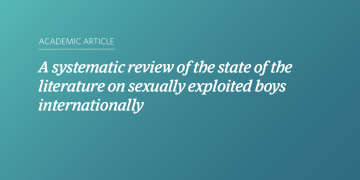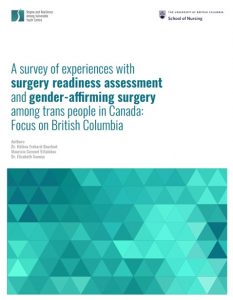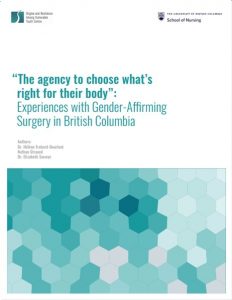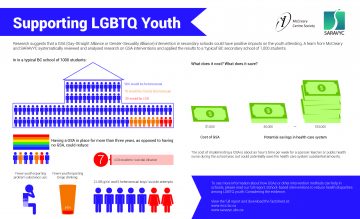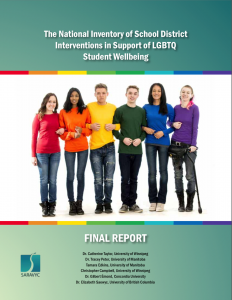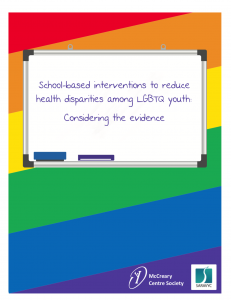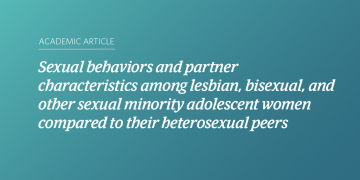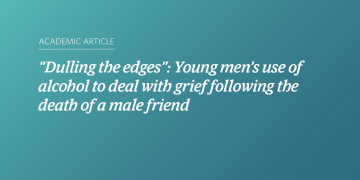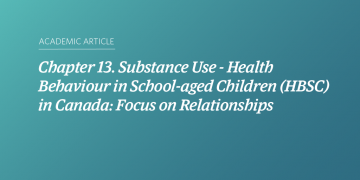A systematic review of the state of the literature on sexually exploited boys internationally
Abstract This systematic review assessed the current state of the literature on sexually exploited boys internationally. We aimed to describe what is known about sexual exploitation of boys, identify gaps in the literature, provide implications for practice, and make recommendations for future research. Multiple database searches were conducted using a combination of controlled vocabulary and […]
A survey of experiences with surgery readiness assessment and gender-affirming surgery among trans people in Canada: Focus on British Columbia
The Gender-Affirming Surgery Experience Survey in BC is the result of a collaboration between the Stigma and Resilience Among Vulnerable Youth Centre (SARAVYC) at the University of British Columbia, and Trans Care BC, a program of the Provincial Health Services Authority. Trans Care BC’s role is to enhance the coordination and availability of trans health […]
“The agency to choose what’s right for their body”: Experiences with Gender-Affirming Surgery in British Columbia
The Qualitative Study of Gender-Affirming Surgery Experiences in BC is the result of a collaboration between the Stigma and Resilience Among Vulnerable Youth Centre (SARAVYC) at the University of British Columbia, and Trans Care BC, a program of the Provincial Health Services Authority. Trans Care BC’s role is to enhance the coordination and availability of […]
The National Inventory of School District Interventions in Support of LGBTQ Student Wellbeing: Final Report
The National Inventory of School District Interventions in Support of LGBTQ Student Wellbeing was one of five research areas in a large project funded by a $2 million grant from the Canadian Institutes for Health Research and headed by Dr. Elizabeth Saewyc at University of British Columbia, “Reducing stigma, promoting resilience: Population health interventions for […]
School-based interventions to reduce health disparities among LGBTQ youth: Considering the evidence
There is a need for health promotion interventions for LGBTQ youth that can reduce critical health gaps that LGBTQ youth experience. Schools are an important environment for youth, and a key place where public health professionals, partnering with school staff, can support effective health promotion strategies. Indeed, some of the best strategies for promoting youth […]
Sexual behaviors and partner characteristics among lesbian, bisexual, and other sexual minority adolescent women compared to their heterosexual peers
Abstract Purpose: Data suggest that lesbian and bisexual adolescents engage in risky sexual behaviors at higher rates than heterosexual girls. Whether these findings also apply to girls of other sexual identities is less well understood. Potential differences in risky sexual behaviors reported by lesbian versus bisexual adolescents are also underreported in the literature. Methods: Data were collected […]
“Dulling the edges”: Young men’s use of alcohol to deal with grief following the death of a male friend
Abstract Background: The death of a male friend can be challenging for men because expressions of grief can be governed and restrained by dominant ideals of masculinity. It is common for young men to engage in health risk practices, such as alcohol overuse, to deal with feelings of sadness. Objective: This qualitative study investigated the ways that […]
Raven’s Children IV: Aboriginal youth health in BC
Since 1998 McCreary has worked in partnership with Aboriginal researchers and community Elders, youth, and adults to produce a specific report about the health of Aboriginal youth who complete the BC AHS. This is the fourth Raven’s Children report and is an in-depth look at the health of youth who identified as Aboriginal on the […]
Chapter 13. Substance Use – Health Behaviour in School-aged Children (HBSC) in Canada: Focus on Relationships
Although the continuing decline of cigarette smoking among adolescents in Canada is good news, the emergence of e-cigarettes use among adolescents bears watching. At present, the research is limited on the health effects of the liquids in e-cigarettes, and it is unclear whether they serve as a route to nicotine dependence and regular tobacco use […]
